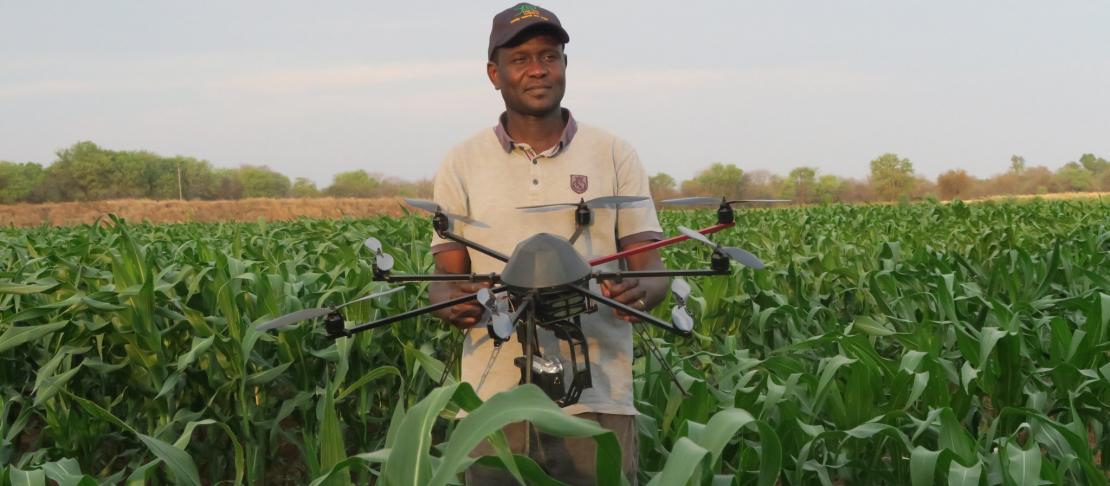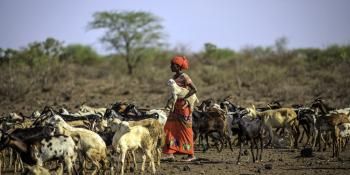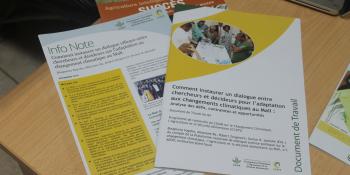World Food Prize Borlaug Dialogue | Wild futures: Technologies for accelerating food systems innovation towards the SDGs

In collaboration with the World Food Prize Foundation, CCAFS is organizing an event on the role of next generation technologies in transforming food systems under climate change.
The World Food Prize & the Borlaug Dialogue
The World Food Prize is the foremost international honor recognizing the achievements of individuals who have advanced human development by improving the quality, quantity or availability of food in the world. Each year, the World Food Prize Foundation organizes the Norman E. Borlaug International Symposium in conjunction with the presentation of the World Food Prize. Known informally as the 'Borlaug Dialogue', the symposium brings together over 1,200 people from more than 65 countries each year to address cutting-edge issues related to global food security and nutrition. The three-day conference convenes a wide array of scientific experts, policy leaders, business executives and farmers.
Background
The global food system is the single largest driver of global environmental change. In the next three decades we will need a 30–70% increase in food availability to meet the demand for food by an increasingly numerous, urbanised and affluent population. Food systems will need to change profoundly if humanity is to be provided with healthy food that is grown sustainably in ways that are both resilient in the face of climate change and do not surpass planetary boundaries.
Registration for this event is required.
Please register via this form.
What might be possible if we adopted new, game-changing technologies? New technologies in the domains of cellular agriculture, digital agriculture, food processing and safety, gene technology, health, inputs, intensification, replacement food and feed, and waste reduction, all have the potential to transform food systems.
But while technological innovation has a critical role to play in transforming food systems, the feasibility of large scale application of such technologies will be determined by various factors including their readiness, potential for adoption and impacts. For example, several technologies related to digital agriculture are relatively mature; digital innovation continues apace, with declining costs and growing uptake in low-, middle-and high-income countries alike. On the other hand, some other technologies are deemed highly unlikely to be available or widely adopted by 2030.
Session objectives
In the context of the need for a transformation in food systems and technological advancement to respond to this need, this session will bring together leaders in science, policy and investment to identify:
- actions to expedite the application of these technologies in current food systems,
- changes required in regulatory frameworks and market structures to enable application at scale, and
- priorities for engagement with issues of social licence and acceptability.
Expected outcome
The session will enable leaders in science, policy and investment to understand the opportunities and challenges associated with the application of next generation technologies to transform food systems and achieve the SDGs, and develop suitable actions in their respective capacities.
Tentative agenda
Description | Name of speaker/panelist | Time |
Welcome and context setting: Transforming global food systems under a changing climate initiative | Ambassador Kenneth M. Quinn, President, World Food Prize Foundation | 12:30 – 12:40 |
| Lunch | 12:40 – 13:00 | |
Setting the scene: "Wild Futures" | Mario Herrero, Chief Research Scientist, Commonwealth Scientific and Industrial Research Organisation | 13:00 – 13:20 |
Keynote presentation: Future technologies and food-systems innovation for accelerating progress towards the SDGs | Bram Govaerts, Director, Integrated Development Program, International Maize and Wheat Improvement Center (CIMMYT) | 13:20 – 13:40 |
Debate |
| |
Panel discussion: Realising a transformation in food systems through next generation technologies | Jan Low, Principal Scientist, International Potato Center, World Food Prize 2016 Laureate | 13:40 – 14:20 |
Miya (Drury) Howell, Director, Sustainable Agriculture Precision Farming, Bayer Crop Science | ||
Ruben Echeverria, Director General, International Center for Tropical Agriculture (CIAT) | ||
Diego Osorio, Head of Partnerships and Resource Mobilization, CGIAR Research Program on Climate Change, Agriculture and Food Security (CCAFS) (Moderator) | ||
Q&A and discussion | 14:20 – 14:40 | |
Closing remarks | Diego Osorio | 14:40 – 14:45 |
For more info about the broader event, see the World Food Prize Foundation event page.
Partners
The session will be organized by the CGIAR Research Program on Climate Change, Agriculture and Food Security (CCAFS) on behalf of the Panel of Experts for Transforming Food Systems Under a Changing Climate, in collaboration with the World Food Prize Foundation.
Additional co-organizers:
- Commonwealth Scientific and Industrial Research Organisation (CSIRO)
- International Potato Center (CIP)
Other partners:
- International Center for Tropical Agriculture (CIAT)
- Bayer Crop Science
- International Maize and Wheat Improvement Center (CIMMYT)


